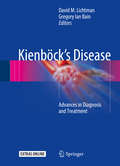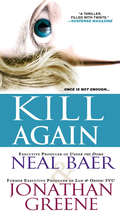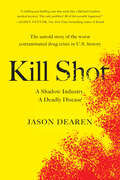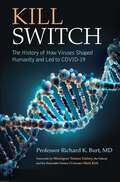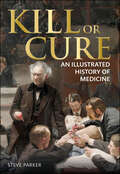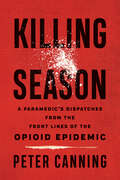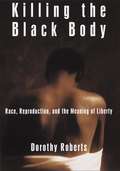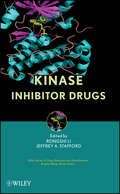- Table View
- List View
Kielhofner's Research In Occupational Therapy: Methods Of Inquiry For Enhancing Practice
by Renee R. TaylorRenée Taylor and an international team of contributors carry on Gary Kielhofner’s innovative vision to demystify the research process and demonstrate that research is essential to occupational therapy practice. They present a comprehensive guide to conducting applied research in the field from qualitative, quantitative, and mixed perspectives for students and clinicians. You’ll begin with a grounding in conducting evidence-based practice in OT and an explanation of the six broad components of the research process. Then you will explore research designs, measurements, and statistical analysis for qualitative and quantitative studies. You’ll examine the steps and procedures required to conduct research and how research can be used to shape professional practice and improve patient care. Additional topics include needs assessment research, program evaluation research, mixed methods research, outcomes research for evidence-based practice, writing a literature review, and obtaining funding for research.
Kielhofner's Research In Occupational Therapy: Methods of Inquiry for Enhancing Practice (2nd Edition)
by Renee R. TaylorWith an international team of expert contributors, Renee Taylor carries on Gary Kielhofner's innovative work in the 2nd Edition of his comprehensive research methodologies text. This guide bridges the gap between theorists and practitioners. It focuses on the relevance and logic of research to provide a practical, demystified approach to conducting applied research in the field for graduate students and clinicians. You'll begin with an introduction to the nature and scope of research and its place in OT and then explore research designs, measurements, and statistical analysis for qualitative, quantitative, and mixed studies. You'll examine the steps and procedures required to conduct research and how research can be used to shape professional practice and improve patient care.
Kienböck’s Disease
by David M. Lichtman Gregory Ian BainCollecting and synthesizing all of the most recent literature on Kienb#65533;ck's disease from around the world, this comprehensive text aims to provide a more dynamic, nuanced treatment algorithm for this enigmatic condition. Part I consolidates the basic science on Kienb#65533;ck's and the lunate, including anatomy, pathology, biomechanics and etiology. Clinical assessment is covered in part II, including radiology, advanced imaging and arthroscopy. The natural history and progression of the condition in children, adults and the elderly is also presented. By far the largest section, part III describes the roles and methods of the various management strategies for Kienb#65533;ck's, from minimally invasive techniques to arthroscopic and arthroplastic procedures. The final chapter draws from all of these concepts, establishes a new algorithm and provides a direction for the future. Written and edited by leaders in the field, and including supplemental video features for select chapters, Kienb#65533;ck's Disease: Advances in Diagnosis and Treatment is a remarkable text that helps unlock this mysterious condition, and will be a valuable resource for hand and orthopedic surgeons, residents and trainees worldwide.
Kierkegaard and Bioethics (Routledge Studies in Nineteenth-Century Philosophy)
by Johann-Christian PõderThis book explores Kierkegaard’s significance for bioethics and discusses how Kierkegaard’s existential thinking can enrich and advance current bioethical debates. A bioethics inspired by Kierkegaard is not focused primarily on ethical codes, principles, or cases, but on the existential 'how' of our medical situation. Such a perspective focuses on the formative ethical experiences that an individual can have in relation to oneself and others when dealing with medical decisions, interventions, and information. The chapters in this volume explore questions like: What happens when medicine and bioethics meet Kierkegaard? How might Kierkegaard’s writings and thoughts contribute to contemporary issues in medicine? Do we need an existential turn in bioethics? They offer theoretical reflections on how Kierkegaard’s existential thinking might contribute to bioethics and apply Kierkegaardian concepts to debates on health and disease, predictive medicine and enhancement, mental illness and trauma, COVID-19, and gender identity. Kierkegaard and Bioethics will be of interest to scholars and advanced students working on Kierkegaard, bioethics, moral philosophy, existential ethics, religious ethics, and the medical humanities.
Kierkegaard and Bioethics (Routledge Studies in Nineteenth-Century Philosophy)
by Johann-Christian PõderThis book explores Kierkegaard’s significance for bioethics and discusses how Kierkegaard’s existential thinking can enrich and advance current bioethical debates.A bioethics inspired by Kierkegaard is not focused primarily on ethical codes, principles, or cases, but on the existential 'how' of our medical situation. Such a perspective focuses on the formative ethical experiences that an individual can have in relation to oneself and others when dealing with medical decisions, interventions, and information. The chapters in this volume explore questions like: What happens when medicine and bioethics meet Kierkegaard? How might Kierkegaard’s writings and thoughts contribute to contemporary issues in medicine? Do we need an existential turn in bioethics? They offer theoretical reflections on how Kierkegaard’s existential thinking might contribute to bioethics and apply Kierkegaardian concepts to debates on health and disease, predictive medicine and enhancement, mental illness and trauma, COVID-19, and gender identity.Kierkegaard and Bioethics will be of interest to scholars and advanced students working on Kierkegaard, bioethics, moral philosophy, existential ethics, religious ethics, and the medical humanities.
Kigo: Exploring the Spiritual Essence of Acupuncture Points Through the Changing Seasons
by Lorie Eve DecharWith references to traditional Taoist and Chinese texts, as well as influences from the author's background in psychology and psychotherapy, this book by Lorie Dechar demonstrates how practitioners can work with the spirit of acupuncture points in modern practice. The concept of 'kigo', a Japanese word meaning 'season word', is used to understand the seasonal energy of the points and how the body relates to the universal flow. As an understanding of the spirit of the point brings focus and potency to a practitioner's needling, it also strengthens their ability to touch a patient's soul and spirit, besides the physical body.Tying in the macro cosmic connection of the body to the universe with a poetic force that amplifies and deepens the effect of acupuncture, Kigo is the perfect companion not only for acupuncturists, but also for chiropractors and psychotherapists, doctors and nurses, and other practitioners who use the points as part of their clinical work.
Kill Again (A Claire Waters Thriller #2)
by Neal Baer Jonathan GreeneWith their electrifying debut, Kill Switch, Neal Baer, executive producer of Under the Dome, and Jonathan Greene delivered "suspense on the order of The Silence of the Lambs" (Denver Post). Now the former executive producers of NBC’s Law & Order: Special Victims Unit are back with a stunning new thriller featuring forensic psychiatrist Claire Waters—and a razor-sharp madman who’s ready to Kill Again…Haunted by a brutal childhood, Dr. Claire Waters finds solace in helping other survivors of abuse. Her favorite patient, Rosa Sanchez, is finally getting her life together after being victimized for years. So it’s a shock when Rosa is handcuffed and led away by a man Claire assumes is law enforcement. But as she soon realizes, Rosa has been abducted.Stunned, Claire turns to her friend Nick Lawler, a homicide detective in the NYPD. Relegated to desk work because of his failing eyesight, Nick will have to risk his career to find Rosa—and track down a deranged criminal who reduces his victims to nothing but bones. A brilliant gamesman obsessed with order and perfection, scrawling words and phrases across the walls of his basement apartment, the killer has been preparing for this moment all of his life—when every letter is in place, every piece is in play—and the object of his obsession, Dr. Claire Waters, is in the game. Win, lose, or die...Kill Again is a harrowing psychological thrill-ride filled with terrifying twists and turns, captivating characters, and mindbending puzzles that will keep you guessing until the final, shocking climax.
Kill Shot: A Shadow Industry, a Deadly Disease
by Jason DearenAn award-winning investigative journalist's horrifying true crime story of America's deadliest drug contamination outbreak and the greed and deception that fueled it. Two pharmacists sit in a Boston courtroom accused of murder. The weapon: the fungus Exserohilum rostratum. The death count: 100 and rising. Kill Shot is the story of their hubris and fraud, discovered by a team of medical detectives who raced against the clock to hunt the killers and the fungal meningitis they'd unleashed."Bloodthirsty" is how doctors described the fungal microbe that contaminated thousands of drug vials produced by the New England Compounding Center (NECC). Though NECC chief Barry Cadden called his company the "Ferrari of Compounders," it was a slapdash operation of unqualified staff, mold-ridden lab surfaces, and hastily made medications that were injected into approximately 14,000 people. Once inside some of its human hosts, the fungus traveled through the tough tissue around the spine and wormed upward to the "deep brain," our control center for balance, breath, and the vital motor functions of life.Now, investigative journalist Jason Dearen turns a spotlight on this tragedy--the victims, the heroes, and the perpetrators--and the legal loopholes that allowed it to occur. Kill Shot forces a powerful but unchecked industry out of the shadows.
Kill Switch (A Claire Waters Thriller #1)
by Neal Baer Jonathan GreeneA prime-time thriller. . . suspense on the order of Silence of the Lambs. --Denver PostHaunted by a disturbing childhood incident, Dr. Claire Waters is drawn to those "untreatable" patients who seem to have no conscience or fear. In a holding cell at Rikers Island, where the young forensic psychiatrist meets with a dangerous inmate whose boyish looks mask a sordid history of violence, her daring methods reveal a key to her own dark past. And when the case propels her into the mind of a homicidal maniac watching her every move, the only way to stop a killer from killing again is to go beyond the edge of reason…"A psychological thriller of the first order."--David Baldacci"A high-octane, intricate thriller, delivered with skill." --Publishers Weekly"A startling, intense suspense novel that will have readers staying up at night--with the light on." --Suspense Magazine"A masterful thriller. Highly recommended." --Douglas Preston"A non-stop thrill ride." --Michael Palmer"Riveting psychological suspense." --Gayle Lynds"A masterful thriller. Highly recommended." --Douglas Preston"Exciting, fast-paced, filled with twists." --The Mystery Gazette"Keeps the reader engrossed and guessing." --Bookreporter.com"Suspenseful." --Booklist"A fast-paced, gritty crime thriller." --Christopher Meloni"Will keep you on the edge of your seat. " --Ice-T"An end you’ll never see coming." --Mariska Hargitay
Kill Switch: The History of How Viruses Shaped Humanity and Led to COVID-19
by Dr. Richard BurtFrom the fall of empires to the rise of global health, Dr. Richard Burt&’s Kill Switch reveals how viruses have shaped human history—and what we must learn to protect our future.Viruses are the invisible architects of life and human history. From ancient plagues to modern pandemics, they have shaped civilizations, altered wars, and redefined medicine. Kill Switch takes you on a riveting journey through the history of viral outbreaks, revealing how these microscopic invaders have influenced everything from who we are to the fall of empires to the rise of global health initiatives—and how they ultimately led to COVID-19. Written by renowned physician and scientist Dr. Richard Burt, this book provides a fascinating look at the intersection of science, history, and public health. Dr. Burt unpacks the story of viruses through gripping historical narratives, groundbreaking medical discoveries, and the critical lessons we must learn. In Kill Switch, you&’ll learn: How viruses shaped human history and determined the rise and fall of empires. How viruses affect global policy and economics. The hidden connections between medical breakthroughs and disease. How governments, scientists, and the public have responded to viral threats. How history chauffeured us to where we are. How good intentions go wrong. Why COVID 19 is so controversial. With engaging storytelling and a cutting-edge detective story, Kill Switch is essential reading for anyone who wants to understand the power of viruses and their impact on our world. Are we doomed to repeat history, or can we adapt to safeguard our future?
Kill or Cure: An Illustrated History of Medicine (DK Short Histories)
by Steve ParkerTelling the compelling stories behind mankind's never-ending quest to cure every disease, Kill or Cure uses an all-new format — a text-rich narrative combined with DK's beautiful visual design — to trace the extraordinary history of medicine. Beginning with early healers, chance discoveries, technological advancement, and "wonder" drugs, and using panels, timelines, and thematic spreads, Kill or Cure highlights information about human anatomy, surgical instruments, and medical breakthroughs while telling the dramatic tale of medical progress. Diaries, notebooks, and other first-person accounts tell the fascinating stories from the perspective of people who witnessed medical history firsthand.
Killer Exposure
by Lara LacombeToxic chemicals and instant chemistry in this tale of murder, medicine and combustible attraction!One minute Hannah Baker is a quiet science professor. The next, a possible murder suspect. Six victims, one per week, all poisoned with the same exotic chemical Hannah once worked with. Now she’s wanted by Houston detective Owen Randall—but is it to enlist her help, or arrest her? Owen knows the prim Hannah is hiding something, but he isn’t sure she’s a killer. Especially after some unfortunate incidents. Is she the next victim of the chemical killer? Torn between duty and his growing feelings, Owen only knows he has less than a week to save her…
Killer Looks: The Forgotten History of Plastic Surgery in Prisons
by Zara StoneKiller Looks is the definitive story about the long-forgotten practice of providing free nose jobs, face-lifts, breast implants, and other physical alterations to prisoners, the idea being that by remodeling the face you remake the man. From the 1920s up to the mid-1990s, half a million prison inmates across America, Canada, and the U.K willingly went under the knife, their tab picked up by the government. In the beginning, this was a haphazard affair -- applied inconsistently and unfairly to inmates, but entering the 1960s, a movement to scientifically quantify the long-term effect of such programs took hold. And, strange as it may sound, the criminologists were right: recidivism rates plummeted. In 1967, a three-year cosmetic surgery program set on Rikers Island saw recidivism rates drop 36% for surgically altered offenders. The program, funded by a $240,000 grant from the Department of Health, Education, and Welfare, was led by Dr. Michael Lewin, who ran a similar program at Sing-Sing prison in 1953. Killer Looks draws on the intersectionality of socioeconomic success, racial bias, the prison industry complex and the fallacy of attractiveness to get to the heart of how appearance and societal approval creates self-worth, and uncovers deeper truths of beauty bias, inherited racism, effective recidivism programs, and inequality.,
Killing Season: A Paramedic's Dispatches from the Front Lines of the Opioid Epidemic
by Peter CanningA devastating, empathetic look at the opioid epidemic in the United States, through the eyes of a paramedic on the front lines.[I] set my cardiac monitor down by the young man's head. He is lifeless, his face white with a blue tinge. I apply the defibrillator pads to his hairless chest... A week from today, after the young man's brain shows no signs of electrical activity, the medical staff will take the breathing tube out, and with his family gathered by his side, he will pass away at the age of twenty-three. When Peter Canning started work as a paramedic on the streets of Hartford, Connecticut, twenty-five years ago, he believed drug users were victims only of their own character flaws. Although he took care of them, he did not care for them. But as the overdoses escalated, Canning began asking his patients how they had gotten started on their perilous journeys. And while no two tales were the same, their heartrending similarities changed Canning's view and moved him to educate himself about the science of addiction. Armed with that understanding, he began his fight against the stigmatization of users.In Killing Season, we ride along with Canning through the streets of Hartford as he tells stories of opioid overdose from a street-level vantage point. A first responder to hundreds of overdoses throughout the rise of America's epidemic, Canning has seen the impact of prescription painkillers, heroin, and the deadly synthetic opioid fentanyl firsthand. Bringing us into the room (or the car, or the portable toilet) with the victims of this epidemic, Canning explains how he came to favor harm reduction, which advocates for needle exchange, community naloxone, and safe-injection sites.Through the rapid-fire nature of one paramedic's view of addiction and overdose, readers will come to understand more than just the science and misguided policies behind the opioid epidemic. They'll also share in Canning's developing empathy. Stripping away the stigma of addiction through stories that are hard-hitting, poignant, sad, confessional, funny, and overall, human, Killing Season will change minds about the epidemic, help obliterate stigma, and save lives.
Killing the Black Body: Race, Reproduction and the Meaning of Liberty
by Dorothy RobertsThis is a no-holds-barred response to the liberal and conservative retreat from an assertive, activist, and socially transformative civil rights agenda of recent years--using a black feminist lens and the issue of the impact of recent legislation, social policy, and welfare "reform" on black women's--especially poor black women's--control over their bodies' autonomy and their freedom to bear and raise children with respect and dignity in a society whose white mainstream is determined to demonize, even criminalize their lives. It gives its readers a cogent legal and historical argument for a radically new, and socially transformative, definition of "liberty" and "equality" for the American polity from a black feminist perspective.
Kilometer 101
by Maxim OsipovA new collection of short fiction and nonfiction by a Russian master of bittersweet humor, dramatic irony, and poignant insights into contemporary life.The town of Tarusa lies 101 kilometers outside Moscow, far enough to have served, under Soviet rule, as a place where former political prisoners and other &“undesirables&” could legally settle. Lying between the center of power and the provinces, between the modern urban capital and the countryside, Tarusa is the perfect place from which to observe a Russia that, in Maxim Osipov&’s words, &“changes a lot [in the course of a decade], but in two centuries—not at all.&” The stories and essays in this volume—a follow-up to his debut in English, Rock, Paper, Scissors—tackle major questions of modern life in and beyond Russia with Osipov&’s trademark blend of daring and subtlety. Deceit, political pressure, ethnic discrimination, the urge to emigrate, and the fear of abandoning one&’s home, as well as myriad generational debts and conflicts, are as complexly woven through these pieces as they are through the lives of Osipov&’s fellow Russians and through our own. What binds the prose in this volume is not only a set of concerns, however, but also Osipov&’s penetrating insights and fearless realism. &“Dreams fall away, one after another,&” he writes in the opening essay, &“some because they come true, but most because they prove pointless.&” Yet, as he reminds us in the final essay, when viewed from ground level, &“life tends not towards depletion, towards zero, but, on the contrary, towards repletion, fullness.&”
Kinanthropometry VIII: Proceedings of the 8th International Conference of the International Society for the Advancement of Kinanthropometry (ISAK)
by Thomas Reilly Marfell-Jones MikeThe International Society for the Advancement of Kinanthropometry held its 8th International Conference in Manchester in July 2002. This volume contains a selection of papers presented to the Conference, where the meeting was held in conjunction with the 12th Commonwealth International Sport Conference, immediately prior to the XVII Commonwealth Games.The Content is structured into five parts:· methodological issues in kinanthropometry· paediatric science· applications of kinanthropometry· women and exercise· health-relations.The collection of the chapters into an edited book provides readers with an outline of the current state of knowledge in kinanthropometry.
Kinase Inhibitor Drugs
by Rongshi Li Jeffrey A. StaffordA comprehensive resource on case studies of marketed kinase drugs and promising drug trialsSince the discovery of protein kinase activity in 1954, the field of protein kinase drug discovery has advanced dramatically. With the ongoing clinical success of the Bcr-Abl kinase inhibitor Gleevec in the treatment of chronic myelogenous leukemia and seven additional marketed kinase inhibitor drugs, researchers have compelling evidence that kinase inhibitors can be highly efficacious in the treatment of diseases caused by aberrant activity of protein kinase. Currently more than 100 protein kinase inhibitors are in clinical development.In one comprehensive volume, the editors, Dr. Rongshi Li and Dr. Jeffrey Stafford, present timely and important case studies of marketed kinase drugs and several of the most advanced kinase inhibitors in clinical trials. Kinase Inhibitor Drugs includes:Case studies from leading investigators and experts in the field that provide firsthand accounts of kinase inhibitor discoveryCurrent thinking on kinase structure, biochemistry, and signal transduction pathwaysInformation on state-of-the-art technologies and tools such as structure-based and fragment-based drug discoveryA lineup of clinical-phase growth factor receptor inhibitorsInhibitors of cell cycle kinasesThe discovery of allosteric inhibitors of MEK kinaseInformation on pharmacogenomics and its application to kinase inhibitor clinical development
Kinase Inhibitors
by Bernhard KusterProtein and lipid kinases are often the master regulators of cell signaling in eukaryotic systems. The human genome codes for more than 500 of these enzymes and their misregulation has been shown to be involved in the onset and progression of many diseases including cancer and inflammation. Therefore, small molecule kinase inhibitors have become important research tools for the elucidation of the many biological roles of kinases and their mechanisms of action. Kinase inhibitors thus also contribute significantly to the drug pipelines of the pharmaceutical and biotechnology industries and to the growing need to treat cancer and inflammation. In Kinase Inhibitors: Methods and Protocols, experts in kinase biology, drug discovery, and clinical research present a series of exemplary methods that can be used to address the many challenges facing scientists in the discovery and development of kinase inhibitors both for research and clinical use. Written in the highly successful Methods in Molecular BiologyTM series format, chapters contain introductions to their respective topics, lists of the necessary materials and reagents, step-by-step, readily reproducible laboratory protocols, and notes on troubleshooting and avoiding known pitfalls. Authoritative and accessible, Kinase Inhibitors: Methods and Protocols aims to provide scientists with modern and relevant methods to accelerate or strengthen their research and drug discovery programs through the utilization of these vital regulators.
Kinder als „Ersatzteillieferanten“ im rechtlichen Kontext: Von der Nabelschnurblutspende zur Selektion von Retterkindern (Veröffentlichungen des Instituts für Deutsches, Europäisches und Internationales Medizinrecht, Gesundheitsrecht und Bioethik der Universitäten Heidelberg und Mannheim #50)
by Alena JerrentrupIn einer erstmaligen Gesamtdarstellung widmet sich dieses Buch der Frage, ob und gegebenenfalls inwieweit es zulässig ist, Kinder als Spender von Körperbestandteilen heranzuziehen oder sogar eigens zu diesem Zweck zu zeugen. Den Ausgangspunkt bildet dabei das Spannungsverhältnis, dass die Kinder zwar zunächst den Befugnissen der Eltern unterstehen, diese jedoch die kindlichen Interessen nicht unberücksichtigt lassen dürfen und elterliche Entscheidungsbefugnisse überdies mit Heranwachsen des Kindes zunehmend in den Hintergrund treten müssen. Die je nach Spendekonstellation unterschiedlich intensiven Eingriffe in die kindlichen Rechte, aber auch die verschiedenen Abstufungen eines möglichen Nutzens für das Spenderkind werden herausgearbeitet und mit Blick auf ihre medizinischen, ethischen und rechtlichen Implikationen analysiert. Zudem wird geprüft, ob in Deutschland derzeit eine widerspruchsfreie Rechtslage hinsichtlich der Erlaubnis respektive des Verbots einzelner Spendeformen durch Kinder existiert oder Handlungs- bzw. Harmonisierungsbedarf besteht. Die untersuchten Rechtsgebiete erstrecken sich vom Medizin- über das Zivil-, hier insbesondere das Familienrecht, bis hin zum Verfassungsrecht; der thematische Bogen reicht dabei von Neugeborenen bis Jugendlichen, Eigen- bis Fremdspenden, Blut- bis Organspenden und schließlich bis hin zur höchst umstrittenen Selektion sog. „Retterkinder” mittels PID.
Kinder in der Augenarztpraxis: Tipps für medizinisches Fachpersonal
by Sylvia MotzWerden Sie zu einer unverzichtbaren Unterstützung für Kinder und Eltern in Ihrer Augenpraxis! Für augenärztliches Assistenzpersonal (AAP) und medizinische Fachangestellte (MFA) in augenärztlichen Praxen stellt die Versorgung von Kindern eine besondere Herausforderung dar. In diesem umfassenden Fachbuch erlernen Sie die nötigen Fähigkeiten für einen erfolgreichen Umgang mit jungen Patientinnen und Patienten und die effektive Durchführung zielführender Augenuntersuchungen. Wie entsteht eine stimmige Kommunikation mit Kindern und Begleitpersonen? Wie eine kinderfreundliche Praxisumgebung? Wie eine vertrauensvolle Bindung und kontinuierliche Langzeitbetreuung über Jahrzehnte? Dabei erhalten Sie wertvolle Tipps und Praxisbeispiele von der erfahrenen Autorin. Für ein fundiertes Hintergrundwissen werden zudem Untersuchungen und Augenkrankheiten im Kindesalter verständlich erklärt. Von der häufigen Kurzsichtigkeit bis zur seltenen Kinderkrankheit – lernen Sie, die Anzeichen zu erkennen und bei der Behandlung zu unterstützen. Gesondert wird auf das Management von Notfällen in der Kinderaugenheilkunde eingegangen, um diese nach Dringlichkeit einzuschätzen und kompetent zu meistern.
Kinder und Smartphones: Apps, Stress und Sucht – ein Elternratgeber
by Florian BredtSmartphones bestimmen unser Leben und damit auch das der Kinder und Jugendlichen. Handys sind nützlich, sorgen aber auch für Stress. Sie können psychische Erkrankungen auslösen – bis hin zur Sucht. Dieser Ratgeber bietet Eltern und Erziehenden einen Überblick über Nutzen und Risiken des Smartphonegebrauchs und zeigt auf, wie Kinder und Heranwachsende angemessen mit dem Mobiltelefon umgehen können. Der Sozialpädagoge und Kinder- und Jugendlichenpsychotherapeut Florian Bredt gibt fundierte Ratschläge, die auf aktuellen Studien beruhen. Themen sind u.a. Cybermobbing, Smartphonesucht und welche Unterstützungsmöglichkeiten und Therapien hier zur Verfügung stehen. Arbeitsblätter zur Medienkompetenz und zum Handygebrauch ergänzen den verständlichen Elternratgeber.
Kinder von Eltern mit psychischen Erkrankungen: State of the Art für Psychotherapeutinnen, Pädiaterinnen, Pädagoginnen (essentials)
by Hanna Christiansen Bernd Röhrle Julia Fahrer Markus Stracke Lisa-Marie DobenerPsychische Erkrankungen sind häufig. Weltweit leben ca. 25 % aller Kinder mit einem psychisch erkrankten Elternteil zusammen. Diese Kinder haben ein erhöhtes Risiko, psychische Störungen zu entwickeln und stellen so eine besondere Risikogruppe dar. Gleichzeitig gibt es für diese Zielgruppe kaum präventive Interventionsangebote. Zudem sind Studien selten, die die Mechanismen und Interventionsmöglichkeiten im Zusammenhang mit der transgenerationalen Transmission psychischer Störungen untersuchen. Das Buch fasst den aktuellen Stand der Forschung zu dem Thema prägnant zusammen und stellt ausgewählte Forschungsprogramme zur verbesserten Versorgung betroffener Familien vor sowie aktuelle Präventionsansätze.
Kinder- und Jugendgynäkologie für die pädiatrische Praxis
by Nikolaus WeissenriederEin symptomorientierter Leitfaden speziell für den Kinder- und Jugendarzt, der schnell zur richtigen Diagnose und Therapie führt: Erfahrungen des Autors aus 25 Jahren als Pädiater und Gynäkologe in der Kinder- und Jugendgynäkologie fließen in dieses Buch ein, das mithilfe von zahlreichen Fotos, Zeichnungen und Tipps anschaulich und praxisnah erklärt, welche Techniken der Arzt in der Kinder- und Jugendgynäkologie einsetzen kann. Es zeigt darüber hinaus auf, welche relevanten Krankheitsbilder und Fehlbildungen er kennen sollte, unterschieden nach häufig, gelegentlich und seltener auftretenden Symptomen. Mit vielen Beispielen aus der Praxis erhält der Leser hilfreiche Anregungen auch für die Kommunikation mit Mädchen und Hinweise für Themen im Rahmen der Prävention. Ergänzt wird das Buch um einen Serviceteil mit Adressen, Links und Normwerten
Kinder- und Jugendmedizin. Fragen und Antworten: 2000 Fakten für die Facharzt-Weiterbildung
by Cihan PapanDieser neue Band aus der bewährten Springer-Reihe Fragen und Antworten präsentiert über 2000 Fakten aus der Pädiatrie. Mit dem Buch können Prüflinge über klassische MC-Fragen die wichtigsten Symptome, Krankheitsbilder und diagnostischen Techniken aus der Kinder- und Jugendmedizin wiederholen, die für die Prüfung und den Alltag relevant sind. Ideal zur Vorbereitung auf die Facharztprüfung und als Wissenstest.


